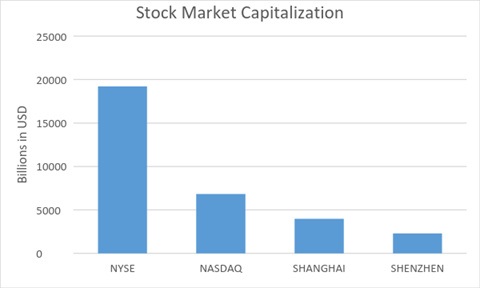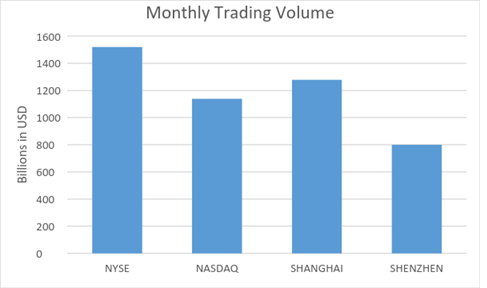The Chinese Stock Market, a learning problem

By Ricardo Rivera August, 3 2015
Translated from spanish by Andrés Contreras
The Chinese stock market’s turbulent journey continues and it’s unlikely to end any time soon. To understand the problem faced by the Chinese government, it’s important to highlight a few points that provide a different perspective. We must take into account the fact that although the Chinese economy is very large, its stock market is relatively small compared to the United States. The market capitalization of the Shanghai Stock Exchange is barely a fraction of the NYSE’s, however it’s important to note that monthly transaction volumes don’t reflect this disparity in market caps.
Source: Data from World Federation of Exchanges
Source: Data from World Federation of Exchanges
You may wonder, how can the Shanghai Stock Exchange have monthly trading volumes that are that high when its market capitalization is that small? The answer lies in the way the Chinese investment sector is conformed.
According to the China Securities Depository and Clearing, more than 10 million new stock brokerage accounts have been opened so far in 2015, which means that there are now more than 100 million investors in the Chinese stock exchange. Compare that to the entire population of the United States, roughly 300 million people. In other words, for every three Americans there is one Chinese stock investor.
Of these 100 million investors, approximately eighty percent are individual investors. That means that there are approximately 80 million retail investors in China, two thirds of which left high school before they were 15 years old and have no financial training.
To sum up, you take a relatively small stock market compared to the U.S., but with similar monthly trading volumes, and you add a very high number of individual retail investors, many of which are financially illiterate, and the end result is nothing but the brutal volatility that we’ve seen on a daily basis. It will take a while for institutional investors to mature, for retail investors to become smarter and for the market to become more stable. Still, despite being shaken by the stock market, it’s too early to tell if the Chinese economy is or is not entering a crisis. We can’t lose sight of the fact that much time has passed which has not allowed or at least has not revealed any concentration of capital in any specific industry or sector, so the impact on the real economy is still diluted over the ticker.
Get our free exclusive report on our unique methodology to predict recessions
Ricardo Rivera
Ricardo studied law at Universidad Francisco Marroquín. He is a teaching assistant at UFM’s Henry Hazlitt Center for introductory economics courses and a class on the philosophy of Hayek.
He is also a teaching assistant at UFM’s School of Economic Sciences for courses on future scenarios, ethics, and debate. At Universidad de San Carlos (USAC) he is a teaching assistant for the law and economics class in the master’s program in intellectual property. He is partner and general manager of the corporate law firm ALISA.
Get our free exclusive report on our unique methodology to predict recessions




